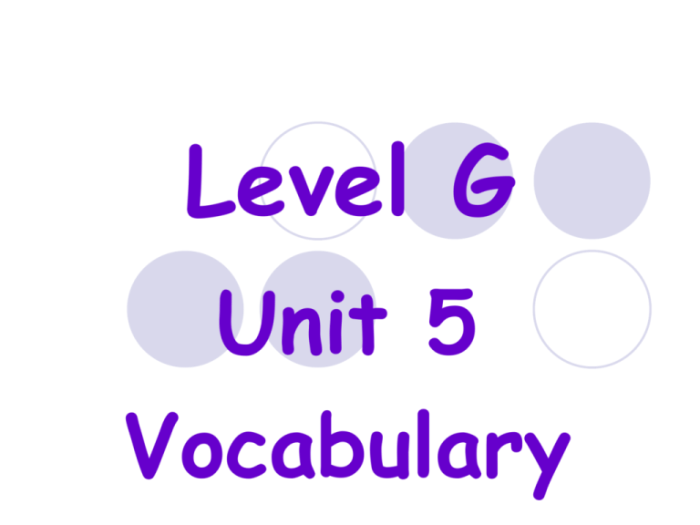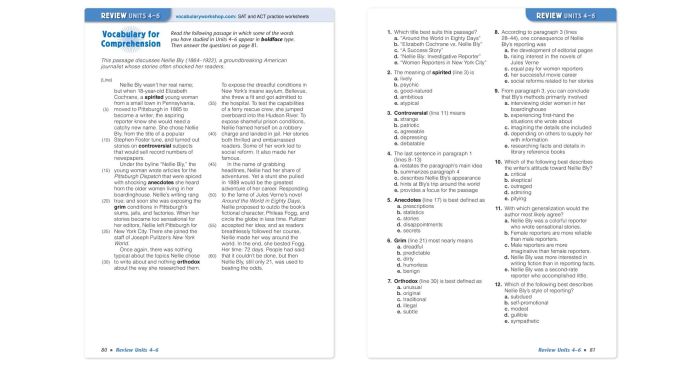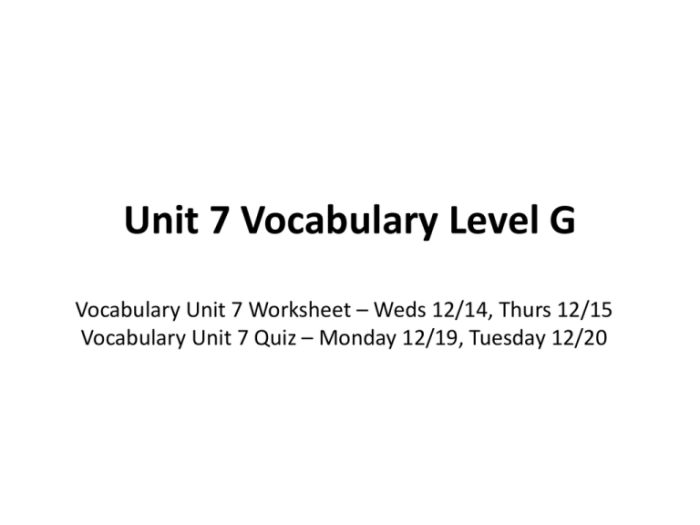Embarking on a journey into Vocabulary Level G Unit 5, we delve into a realm of linguistic exploration. This unit aims to expand your vocabulary horizons, empowering you with the tools for precise and effective communication.
Vocabulary Level G Unit 5 encompasses a diverse range of word types, from essential everyday terms to sophisticated academic vocabulary. By mastering these words, you will not only enhance your comprehension but also elevate your ability to express yourself with clarity and impact.
Definition of Vocabulary Level G Unit 5

Vocabulary Level G Unit 5 introduces students to a set of advanced and specialized words commonly used in academic and professional contexts. It aims to expand their vocabulary and enhance their ability to comprehend complex texts and express themselves effectively.
This unit focuses on words related to various domains, including science, technology, literature, and social studies. By mastering these terms, students will be better equipped to engage in critical thinking, analysis, and effective communication in academic and professional settings.
Components of Vocabulary Level G Unit 5
Vocabulary Level G Unit 5 comprises a diverse range of vocabulary components, encompassing both academic and everyday words. These components play a crucial role in expanding students’ linguistic repertoire and enhancing their overall communication skills.
Types of Vocabulary Words
This unit introduces students to various types of vocabulary words, including:
- Content Words:These are the core words that carry the main meaning of a sentence, such as nouns, verbs, adjectives, and adverbs.
- Function Words:These are words that serve grammatical functions, such as prepositions, conjunctions, and articles.
- Figurative Language:This includes words and phrases that use figurative devices, such as metaphors, similes, and personification.
- Academic Vocabulary:These are words that are commonly used in academic settings, such as “analyze,” “hypothesize,” and “synthesize.”
- Everyday Vocabulary:These are words that are used in everyday conversation, such as “happy,” “sad,” and “excited.”
al Strategies for Teaching Vocabulary Level G Unit 5
Teaching vocabulary effectively requires a combination of strategies that cater to different learning styles and engage students. Here are some al strategies to enhance vocabulary skills in Level G Unit 5:
Interactive Games and Activities
Incorporating interactive games and activities can make learning vocabulary enjoyable and memorable. Consider using:
- Word Charades:Students take turns acting out vocabulary words while their peers guess.
- Vocabulary Bingo:Create bingo cards with vocabulary words and have students listen for or read definitions.
- Crossword Puzzles:Design crossword puzzles with vocabulary words as clues, fostering problem-solving skills.
Meaningful Context
Providing vocabulary in meaningful contexts helps students understand the words’ usage and significance. Try:
- Storytelling:Incorporate vocabulary words into engaging stories or scenarios.
- Real-Life Examples:Connect vocabulary words to real-life situations, making them relatable.
- Visual Aids:Use images, videos, or diagrams to illustrate the meaning of vocabulary words.
Technology Integration
Technology can enhance vocabulary learning by providing interactive and engaging resources. Explore:
- Vocabulary Apps:Utilize mobile apps that provide interactive games, flashcards, and quizzes.
- Online Games:Engage students with online games that focus on vocabulary building.
- Virtual Reality (VR):Immersive VR experiences can provide contextualized vocabulary learning.
Repetition and Review
Regular repetition and review are crucial for vocabulary retention. Implement strategies such as:
- Flashcards:Create flashcards with vocabulary words and definitions for students to practice regularly.
- Weekly Vocabulary Lists:Provide students with weekly lists of vocabulary words for ongoing review.
- Quizzes and Assessments:Conduct regular quizzes and assessments to monitor students’ progress and identify areas for improvement.
Assessment of Vocabulary Level G Unit 5
Assessing student learning in Vocabulary Level G Unit 5 involves evaluating their understanding of the target vocabulary words and their ability to use them effectively in context.
Various methods can be employed to assess student learning, including:
Formal Assessments, Vocabulary level g unit 5
- Vocabulary Quizzes:These short quizzes test students’ knowledge of the meanings, spellings, and pronunciations of the target words.
- Unit Tests:Comprehensive tests that assess students’ overall understanding of the unit’s vocabulary, including their ability to use the words in context and understand their nuances.
Informal Assessments
- Class Discussions:Encourage students to use the target words in discussions, allowing you to observe their understanding and usage.
- Student Journals:Have students keep journals where they write sentences or paragraphs using the target words, demonstrating their comprehension and application.
- Word Walls:Display target words on a word wall and ask students to interact with them, such as defining them or using them in sentences.
Other Assessment Tools and Techniques
- Matching Exercises:Match target words with their definitions or synonyms.
- Fill-in-the-Blank Exercises:Provide sentences with missing target words that students must fill in.
- Crossword Puzzles:Create crossword puzzles that incorporate the target words as clues.
By utilizing a combination of formal and informal assessments, you can effectively evaluate students’ progress and provide targeted support to enhance their vocabulary development.
Integration of Vocabulary Level G Unit 5 into the Curriculum

Vocabulary Level G Unit 5 can be integrated into other subject areas to reinforce vocabulary acquisition and enhance overall learning. By connecting vocabulary to real-world contexts and interdisciplinary activities, students can develop a deeper understanding and appreciation for language.
One way to integrate vocabulary is through interdisciplinary projects. For example, in social studies, students could research historical events or figures and create presentations that incorporate vocabulary terms from Unit 5, such as “legacy” or “pioneer.” In science, students could conduct experiments and write lab reports that use vocabulary related to scientific concepts, such as “hypothesis” or “theory.”
Vocabulary Level G Unit 5 is essential for mastering the complexities of global history. To further enhance your understanding, check out the fiveable ap world unit 8 for additional insights and practice questions. Returning to Vocabulary Level G Unit 5, it’s crucial to delve into the nuances of historical terms and concepts to fully grasp the tapestry of world history.
Interdisciplinary Activities
Here are some specific examples of interdisciplinary activities that can integrate Vocabulary Level G Unit 5:
- Language Arts:Have students write poems or short stories that incorporate vocabulary from the unit. Encourage them to use the words in creative and meaningful ways.
- Social Studies:Ask students to create a timeline of historical events and label each event with a vocabulary term from the unit that best describes it.
- Science:Conduct a science experiment and have students write a lab report that uses vocabulary from the unit to explain the results.
- Math:Create a math problem that incorporates vocabulary from the unit and have students solve it.
- Art:Have students create a piece of art that represents a vocabulary term from the unit.
By integrating Vocabulary Level G Unit 5 into other subject areas, teachers can help students make connections between different disciplines and develop a more comprehensive understanding of the world around them.
Resources for Vocabulary Level G Unit 5

In this section, we will explore a variety of resources that can be used to support teaching and learning in Vocabulary Level G Unit 5. These resources include websites, books, and other materials that provide engaging and effective ways to enhance vocabulary development.
Websites
- Vocabulary.com:This website offers interactive games, quizzes, and activities to help students build their vocabulary. It also provides access to a vast database of words and their definitions.
- Merriam-Webster:This online dictionary provides definitions, pronunciations, and examples of words. It also includes a thesaurus and other resources for language learners.
- Oxford English Dictionary:This comprehensive dictionary offers detailed definitions, etymologies, and usage examples for a wide range of words.
Books
- Building Vocabulary: From Word Roots to Critical Readingby Margaret A. Richek: This book provides a systematic approach to vocabulary development, focusing on word roots, prefixes, and suffixes.
- Word Power Made Easyby Norman Lewis: This classic text offers a comprehensive list of vocabulary words with their definitions and usage examples.
- Vocabulary Builder Workbookby Academic Success Media: This workbook provides practice exercises and activities to help students expand their vocabulary.
Other Materials
- Flashcards:Create flashcards with vocabulary words and their definitions. Students can use these flashcards to practice and review the words.
- Word Walls:Display a word wall in the classroom with vocabulary words and their meanings. Students can refer to the word wall throughout the unit.
- Vocabulary Journals:Have students keep vocabulary journals where they can record new words, their definitions, and examples of usage.
Helpful Answers
What is the significance of Vocabulary Level G Unit 5?
Vocabulary Level G Unit 5 plays a crucial role in enhancing your overall communication skills. By expanding your vocabulary, you gain the ability to express yourself more precisely and comprehend complex texts and conversations.
How can I effectively learn the vocabulary in this unit?
To effectively learn the vocabulary in Vocabulary Level G Unit 5, employ a combination of techniques such as spaced repetition, flashcards, and engaging in meaningful conversations. Additionally, utilizing online resources and seeking support from peers or a tutor can enhance your learning experience.
What types of assessment tools are used to evaluate student learning in this unit?
Assessment tools used in Vocabulary Level G Unit 5 may include vocabulary quizzes, essays, oral presentations, and portfolio-based assessments. These tools evaluate your understanding of word meanings, usage, and application in various contexts.